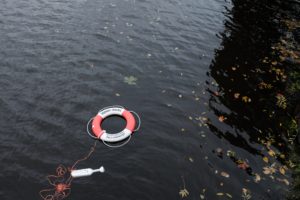by Jenny Rose | Aug 9, 2018 | Connection & Community, Emotional Intelligence, Parenting

Photo by Tyler Quiring on Unsplash
We have the great privilege of living close to ravens. These intelligent and entertaining birds make the area off our deck part of their daily rounds, because that’s where we fling the mice caught in mousetraps in the kitchen cupboards, as well as the occasional food rubbish. They’re wary birds. Any flicker of movement in a window sends them aloft, no matter how tempting the morsel on the ground. They make a variety of sounds, but can also be as quiet as a shadow as they wheel over the house, circling and examining the grassy slope below the deck.
This year a pair nested nearby and raised at least one fledgling successfully. Both parents feed the nestlings. A few weeks ago, some instinctive wisdom told the raven parents it was time to stop feeding the fledglings and all hell broke loose in the neighborhood.
The first we knew of it was a plaintive croaking cry, vaguely like a canine yap. We heard it over and over again, clearly coming from something on the wing. It began down over the river and moved up the hill to the house and then I could see the birds. The fledgling was pudgy and puffy, the way all young birds are at the adolescent stage. It looked a little bigger than the adult birds, but not nearly as sleek and not as skilled a flier. The adults flew around it in what looked like a mixture of distress and encouragement, and the youngster complained. And complained. And complained. For hours. Then for days. From first light until sunset it went on.
We watched the parent birds, looking more harried by the day, try to go about their usual rounds up and down the road for roadkill, over our place, over the river and pond, followed everywhere by their noisy, clumsy, demanding offspring, who certainly had the ability and strength to feed himself, if not the desire. At rest, the youngster would gape pathetically, begging each parent in turn for a regurgitated mouthful. Repeatedly, the parents turned away, flew away, dogged and determined.

Photo by Casey Horner on Unsplash
Ravens are great generalists in terms of their diet. I’m sure the fledgling watched his parents eat carrion, fish, frogs, small reptiles and mammals, insects and plant matter. What we were witnessing was not starvation due to lack of available food, or lack of parenting. What played out before us was nothing more or less than adolescent outrage and parenting far superior to anything I ever achieved.
Both my partner and I are parents and worked for years with parents and children. We watched the ravens with a mixture of amusement, empathy and irritation. “Go find your own dead thing,” my partner muttered, imagining the parent birds’ conversation with the importuning fledgling and making me laugh.
When my two sons chose to leave the little mountain town where we lived and finish out their high school years with their dad in the city, I knew it was the right thing for them to do. It was sooner than I had anticipated, true, but we all recognized they had outgrown the school, the town and me. We were no longer living in harmony.
When I found myself alone, I grieved for a long time. I also sold the house and started shaping a life for myself with the good feeling of a difficult job done to the very best of my ability. I’d given all I could and it was time for them to fly and find their own lives. In the space where they had been for fifteen years I could build new freedom and possibility.
Except they were nearly always in my thoughts. We had long phone conversations. I fretted because I couldn’t interact with them face-to-face and I knew many things were happening in their lives they weren’t telling me about. They did tell me of jobs, roommates, broken-down cars, financial difficulties, bars, music, both new and old friends, and romantic entanglements. They called when they were broken-hearted, scared, confused or just pissed off. Frequently, by the time I got off the phone, I was in tears and spent the rest of the day upset, or lay sleepless wondering what I could do. What I should do. What I should have done as a parent that I didn’t do that might have avoided the current crisis.

Photo by Jordan Whitt on Unsplash
I discovered parenting adults is extraordinarily stressful and difficult, with none of the sweet pay-offs I had when we were a family living together. I didn’t see them playing and laughing anymore. I couldn’t touch them or hold them. We couldn’t hang out quietly together. I couldn’t cook for them or watch their faces and bodies mature, marveling at these two people their father and I created.
I’ve recognized in the years between their leaving me and now I wasn’t the excellent parent I thought I was. I was, in fact, merely adequate. I made a lot of mistakes. I was in many ways ill-equipped to parent. Single parenting is an almost impossibly hard road.
I talk to other mothers of adults. Some talk at length about their kids — how proud they are of them, how close they are to them, how successful their kids are. Those parents need no questioning or encouragement. Their conversation is full of their kids all the time, without prompting, and sometimes it’s hard to tell whether the offspring in question is ten or thirty.
Other women, though, acknowledge kids, grandkids and great grandkids, but are not nearly so forthcoming. I’m of that tribe now. Given a sympathetic listener and a relationship of trust, these women tell stories of various addictions, mental illness, toxic relationships, unplanned grandchildren and great-grandchildren, financial struggles, pain, anger, grief and guilt. We find ourselves raising grandchildren and great-grandchildren. We co-sign for loans we can’t afford to pay off. We wonder what we did, or said, or didn’t do or didn’t say that resulted in our kids’ addictions, struggles and unhappiness.

Photo by Josh Applegate on Unsplash
The love that was once the center of our lives and priorities, the strongest, purest feeling we’ve ever had, gradually becomes bewildered and confused. We look everywhere for the children of our memories, but they’re gone. Now, in front of us, are adults. From adults we want responsibility, appropriate boundaries and reciprocity, but our adult children want the unobstructed flow of our nurturing, support and unconditional love to continue, just as it did when they were children.
I didn’t think it would be like this, and neither did my friends.
My thoughts and feelings about my experience as a parent are so tangled I can’t see anything very clearly. Perhaps that’s why I was so taken with the ravens. The animal kingdom has a kind of brutal simplicity with regard to parenting, an instinctive wisdom without concern for what anyone else thinks or cultural and societal norms. The raven parents knew what to do and they did it and endured a few days of discomfort.
Does that mother bird now worry about whether the young adult is happy or not?
Sigh. Probably not.
I notice I never even consider blaming my parents for my happiness or unhappiness. Why, then, do I persist in blaming myself for my adult sons’ choices? Why do I think it’s any of my business at all?
Because I love them.
And so?
And so I want them to be well, and happy, and have good lives.
There are deeper truths, though. I want to be able to think of myself as a great parent. The proof? My adult kids have happy, healthy lives. See how great I was? I also want them to be happy so I don’t have the discomfort of knowing they’re unhappy. How’s that for a piece of maternal selfishness?
So, what, exactly, does a happy, healthy life look like? Is it a life we can boast about in company to illustrate the competence of our parenting? Is it the life “everyone” approves of? Is it the life I approve of? Why do I think I know what a happy, healthy life is for anyone except myself? Most important of all, why did I think I had the power to determine the kind of lives my kids would have?
As parents, we have a lot of power, at least in the beginning. But our power is mixed up with other factors which are not in our control, like genetics, culture, geography and politics. If we judge our parenting effectiveness by the perfect happiness of our adult children, we’re all monumental failures. Life is not one unbroken experience of unadulterated happiness for anyone. Unblemished happiness is, in any case, a lazy, childish goal. What does it mean? Something different to everyone, probably.
What about competence? Yes. I want my kids to be competent. I want them to be able to learn. I want them to have the power to make their own choices and the strength to deal with the consequences. I want them to know how to self-care and love others. I want them to be compassionate, respectful and responsible.
I want those things for them, but I also want them for me so I can feel I parented well and gave them the kind of start every child deserves.
Parenting is an odd business. We enter into years of chaos and hard work and watch our children grow up, never realizing we’re growing up, in many ways, alongside them.
As parents, is it about us, or is about our kids?
I suppose the honest answer is it’s about both, although it feels shameful to admit that out loud.
On the other hand, maybe that’s exactly the way it’s supposed to be. Who knows?
Ravens are solitary. We still have a couple in the neighborhood. I wonder if the youngster has left to find new territory. In time, he may find a mate and raise his own fledglings. He may be killed by a car, a gun, or a predator. He’s on his own in the big world to live his life, however that is, and die his death, however that is. Will the parent birds know? If they know, will they care? Would their knowing or caring assist the young bird in any way, or have they given everything needed already, including forcing the adolescent to begin feeding himself?
I don’t have answers. Nobody I’ve spoken to has answers, but we’re all asking these questions.
I wonder what the ravens would say.
I’m off to find my own healthy and happy afternoon and give my concerns about everyone else a rest.

Photo by Liane Metzler on Unsplash
All content on this site ©2018
Jennifer Rose
except where otherwise noted
by Jenny Rose | Mar 15, 2018 | Power

Photo by Vladislav M on Unsplash
I’ve always been fascinated by the psychology of survival. I observe that we as a culture are obsessed with heroes and rebels and the endless struggle between archetypal good and evil. Survival kits are becoming a thing in marketing. Preppers write blogs and have TV shows.
Interestingly, our social and cultural world actively inhibits our ability to survive in all kinds of ways. Public school education might be said to be a long indoctrination in anti-survival. We spend hours with our mouths open in front of screens in dark rooms, enchanted by movies and games. Congregations of fans share reverence for comic book characters and the happenings in galaxies far, far away. We debate, criticize and celebrate the way these carefully constructed heroes dress, speak, look, act and collaborate with special effects. We have high expectations of our heroes. We imbue them with nostalgia. We expect our heroes to be just, compassionate, intelligent, interesting, attractive, moral, humorous, strong and poised.
Meanwhile, dangerous events take place in our families; in our workplaces, subways, airports and schools; in our world.
We wait for someone to neutralize the danger, clean it all up, drain the swamp, and make it all fair. We wait for rescue. We turn a blind eye. We do whatever it takes to distract ourselves from uncertainty, fear and our own powerlessness. We watch the beast lumber toward us and deny its presence, deny its existence until we find ourselves in its belly, and then we still refuse to believe.
I’ve been reading author Laurence Gonzales. He’s written several books (see my Bookshelves page). We have Deep Survival and Everyday Survival in our personal collection. Gonzales has made the subject of survival his life’s work. He’s traveled extensively, synthesized studies and research and spent hundreds of hours interviewing people involved with all kinds of catastrophes, both natural and man-made. His books are thoughtful, well-written, extraordinarily well researched and utterly absorbing.
Gonzales uncovers the astounding complexity of human psychology and physiology as he explores why we survive, and why we don’t. He’s discovered some profound and surprising truths.
The best trained, most experienced, best equipped people frequently do not survive things like avalanches, climbing accidents, accidents at sea and being lost in the wilderness. Sometimes the youngest, weakest female has been the sole survivor in scenarios like this. It turns out some of the most important keys to survival appear to be intrinsic to our personalities and functioning, not extrinsic.

Photo by Tommy Lisbin on Unsplash
Gonzales does not suggest, and nor do I, that training, equipment and experience don’t count, just that they’re not a guarantee. In some cases, our experience and training work against us in a survival situation, because we assume a predictable and familiar outcome in whatever our activity is. We’ve made the climb, hike, journey before, and we did just fine. We’ve mastered the terrain and the necessary skills.
Mt. Saint Helen’s had never erupted before. Therefore, all those people who stood on its flanks and watched in wonder failed to grasp that something new and unprecedented was happening. Their inability to respond appropriately to a rapidly changing context killed them. The same thing happens during tsunamis. People are awed and transfixed. They have no direct experience of a tsunami bearing down on them as the water rolls back to expose the sea bed. They don’t react in time.
There’s a model called the OODA loop. The acronym stands for Observe, Orient, Decide, Act. Our ability to move quickly through the OODA loop is directly linked to our ability to survive.
Observation, the ability to be here now, the ability to recognize what is, is something everybody can practice all the time. No special equipment or training needed. What is needed, though, is the emotional and cognitive willingness (consent, if you will) to set aside our distractions, addictions, rigid preconceptions and expectations (often invisible to us, making them even more deadly) and dependence on stimulation. It also requires a mind set of self-responsibility. It turns out movie theatres, schools, concert venues and many other places are not safe. We can debate, deny and argue; protest and rally; scapegoat and write new laws. We are and we will. In the meantime, the reality is we are increasingly unsafe in many public places, and no one has the power to wave a wand and take care of that for us.
It’s up to us to take care of ourselves. That starts with observation.
In my post on self-defense I mentioned situational awareness. Our instructor emphasized that skill as being more important than any other move or weapon. If we see or sense something dangerous in our vicinity, it’s up to us to orient and move to a safer location.
That brings up another very important survival skill: instinct. At this point science cannot measure instinct, but Gonzales’s instinct about getting on a certain plane saved his life once, and many of us have similar stories. As far as I’m concerned, instinct is part of observation. What do we observe? How do we feel about what we observe?

Photo by Wynand van Poortvliet on Unsplash
Our instinct is blunted in all kinds of ways. It’s mixed up with political correctness, including racial profiling. Few of us want to demonstrate discomfort around others for any reason these days. I invariably feel guilty when I react to someone negatively, even if my reaction is entirely private. It’s bad and wrong to judge, to cross the street to avoid somebody. It’s ugly and hateful.
Additionally, I’m a woman and I’m highly sensitive, which makes me particularly attuned to body language, voice inflection and all the clanging (to me) subtext of communication beneath whatever words are spoken. I can’t prove my intuition. I can’t demonstrate it logically. I have no wish to diminish or disempower others. I’m not a bigot. All people have energy and sometimes it’s foul. I reserve the right to move away from it. If that makes me hateful, woo, dramatic or hysterical, so be it. I’m accomplished in the art of noncompliance, but many are not.
If we only see what we expect to see, we aren’t observing. If we fail to see what we’re looking at, we’re not observing. If we can’t take in the whole picture, we’re not observing. If we look for something instead of at everything, we’re not observing. We’ve already broken the OODA loop.
Observing and orienting mean coming to terms with what we see. The plane is down. Our ankle is broken. We’re lost in a whiteout blizzard off the trail. We can’t decide how we’re going to survive if we’re unable to accept and orient to what is.
As a young woman, I did fire and rescue work. I was an IV-certified EMT, and I learned in those days that panic, fear and despair are killers. They’re also highly contagious. People who survive lock those feelings away to deal with after they’re safe again. Gonzales found, amazingly, some people will sit down and die, though they have a tent, food and water in the pack on their back. They just give up.
I also learned that the hysterical victims are not the ones most likely to die in a multiple trauma event. They demand the most attention, certainly, but it’s the quiet ones who are more likely to have life-threatening injury and slip away into death. The screamers and the drunks, the ones blaming, excusing and justifying, are frequently the cause of the accident and retard rather than assist in the survival of themselves and those around them.
On the other hand, strength, determination and calm are also contagious. If just one or two people in a group keep their heads and take the lead, chances for survival begin to increase for everyone.
When I was trained as a lifeguard and swimming teacher, I learned something that’s always stayed with me.
You can’t save some people. It’s possible to find yourself in a situation where, in spite of your training and best efforts, the victim is so combative or uncooperative, or the circumstances so impossible that the choice is between one death or two. This fact touches on my greatest impediment to survival, which, ironically, is also one of my greatest strengths.
My compassion and empathy mean I frequently put the needs of others before my own. I do it willingly, gladly, generously and out of love. It’s one of my favorite things about myself, and it’s also one of my most dangerous behaviors.
Consider a scene many of us are metaphorically familiar with. Someone nearby is drowning. They’re screaming and thrashing, weeping, begging to be saved. We throw them a rope so we can pull them out. They push it away and go on drowning because the rope is the wrong color. Okay, we say, anxious to get it right and stop this terrible tragedy (not to mention the stress-inducing howling). We throw another rope, but this one is the wrong thickness. It, too, is rejected, and the victim, who is remarkably vocal for a drowning victim, continues to scream for help.

Photo by Lukas Juhas on Unsplash
On it goes, until the rescuer is exhausted, desperate, deafened and feeling more and more like a failure. Meanwhile, the “victim” goes on drowning, loudly, surrounded by various ropes and other lifesaving tools. We, as rescuer, are doing every single thing we can think of, and none of it is acceptable or adequate. In our frantic desire to effect a rescue at the cost of even our own lives, we’ve ceased to observe and orient. We’re not thinking coolly and calmly. We’re completely overwhelmed by our emotional response to someone who claims to want help.
The survivor in this picture, my friends, is not the rescuer. The so-called victim is the one who will survive. If they do grudgingly accept a rope and are successfully pulled out of the water, they immediately jump back in.
The will to survive is an intrinsic thing, and I can’t give or lend mine to someone else. People who can’t contribute to their own survival, and we all know people like that, are certainly not going to contribute to mine, and some will actively and intentionally pull me down with them, just because they can.
I don’t have to let that happen, but in order to avoid it I need to be willing to see clearly, accept what I see, cut my losses and act in my own behalf. Real life is not Hollywood, a comic book or virtual reality. It’s not my responsibility to be a savior, financially, emotionally, sexually or in any other way. The word survivor does not and cannot apply to everyone.
It’s a harsh reality that doesn’t have much to do with being politically correct or approval and popularity, and most people have trouble facing it, which will inhibit their survival if they ever find themselves in an emergency situation.
Gonzales covers this at some length in Deep Survival, and he rightfully points out that compassion and cool or even cold logic are not mutually exclusive. People in extreme situations sometimes have to make dreadful decisions in order to live, and they do. A compassionate nature that does what must be done may buy survival at the cost of life-long trauma. Ask any combat veteran. This is the side of the story the Marvel Universe doesn’t talk about. Survival can be primitive, dirty and gut wrenching. Sending blue light and thoughts and prayers are not the stuff of survival.
Clear orientation leads to options and choices. Evaluating available resources and concentrating on the basics of survival: water, food, shelter, warmth, rest and first aid are essential. Thinking coolly and logically about what must be done and breaking the task into small steps can save people against all odds.
Sometimes, death comes. Eventually, we all reach our last day. In that case, there’s no more to be said. Yet the mysterious terrain on the threshold between life and death is remarkably defining. I wonder if perhaps it’s the place where we learn the most about ourselves.

Photo by Andrew Neel on Unsplash
I’ve known people who stockpile weapons and ammo, bury gold in bunkers, build off-grid compounds and obsess about survival equipment and bug-out bags. Many wilderness schools teach basic and advanced survival techniques. Some folks put all their financial resources into prepping for catastrophe and collapse. I’m nervous about the state of the world on many levels myself, so I understand, but I can’t help thinking that investing in a story about living in a guarded, fully-equipped compound is not much better than investing in a story that water will continue to run from faucets, a wall socket will deliver electricity and grocery shelves will hold food, forever and ever, amen.
After reading Gonzales, I’m considering maybe simply living life is the best preparation for survival. Trusting my instinct; learning to manage my power and feelings; being aware of the limitations of my experience, expectations and beliefs are all investments in survival. Simply practicing observation is a powerful advantage. I don’t have money to spend on gear and goodies I might or might not be able to save, salvage or retain if things fall apart. The kind of investment that will keep me alive is learning new skills, staying flexible and adaptive, developing emotional intelligence and nurturing my creativity. No one can take those tools away from me and I can use them in any scenario.
We’re born with nothing but our physical envelope. Ultimately, perhaps the greatest survival tool of all is simply ourselves, our wits and our will.
All content on this site ©2018
Jennifer Rose
except where otherwise noted
by Jenny Rose | May 4, 2017 | Choice, Power
Last Friday I resigned from my medical transcription job. Shortly after emailing my letter of resignation to my supervisor, she called me, wanting to know why.
I told her the truth. I don’t feel as though my contribution matters. I don’t like the company culture of perfectionism and high stress. I don’t feel valued as an employee, and my skills and talents are worth more than I’m receiving.

Photo by rawpixel.com on Unsplash
We parted in a friendly manner. She assured me I was eligible for re-hire any time and wished me well. I wished her and the rest of the team well. Cyber handshakes and smiles all around.
I’m in the middle of selling a property back in Colorado. I currently have wonderful renters in the house. They’ve been honest, cooperative, open and have done every single thing they’ve said they would do. They’ve become friends. I’m faxing paperwork, including the lease with these tenants, to Colorado and working with my Colorado real estate agent long distance. The agent expressed surprise that our rental agreement didn’t contain language about punitive consequences if the tenants suddenly decided to break the lease and leave.
It never entered my head to limit my tenants’ choice to leave if they were unhappy. Obviously, at least one property professional feels this is inappropriate business practice, but why would I want to force two people whom I respect and like to stay in a situation that wasn’t working for them?
Answer: I wouldn’t want to, I didn’t want to and I don’t want to.
Last evening I had a long conversation with one of my sons, and among the things we talked about was the idea of noticing how things are within ourselves and the choices we make about our own unhappiness and discomfort.
This morning, as I fried bacon and sausage and worked in the kitchen, I was thinking about this week’s post, trying to come up with something I wanted to write about from my current experience, and suddenly all these interactions lined up in my head (Clunk! Clunk! Clunk!) and I thought, well, there it is. I want to write about quitting.
What do you think of when you think of quitting?

Photo by Milada Vigerova on Unsplash
I think of the word “should,” as in should quit smoking, should quit drinking, should quit eating so much sugar, should quit fill-in-the-blank. These are the kind of circumstances under which quitting is supported and validated, but the “should” is an instrument of shame, guilt and fear, as well as a thoroughly ineffective motivator.
I was taught being a quitter or a dropper outer is a desperately mortifying thing. Quitting is associated with betrayal, abandonment, failure, letting others down and weakness.
Quitting is often an act of aggression. It’s what we do when we’ve hung on by our fingernails until they’ve torn out, one by one, and we have to let go or die. It’s hitting bottom. It’s burnout, breakdown and nothing left to lose, often accompanied by scenes, meltdowns and an exchange of insults.
Quitting is selfish and irresponsible. Choosing to be happy is an embarrassing thing to admit. We’re told If everyone did what made them happy, everything would unravel. Nobody would work. Important things wouldn’t get done. The economy would collapse.
There are cultural consequences for quitting. The label “quitter” impairs our ability to get hired, find stable relationships or make financial choices. A quitter is unreliable and untrustworthy at best. Someone who quits their marriage, family or children is so despicable as to be unforgiveable in some cases.
The word quit, according to a quick search, means to leave a place, resign from a job or stop or discontinue an activity. In short, it’s a word that defines a choice. Interestingly, one of its origins is Middle English, in which it means “set free.”
Set free sounds a lot more positive than quitting, doesn’t it?
It occurs to me that the whole idea of quitting is rooted in power. To quit is to stop. How is it that the culture is so unfriendly and unsupportive, for the most part, of making a choice to stop? Why are we so consistently and pervasively discouraged from saying no, from quitting, from changing?
I’ve written before about the yes and the no. To be in our full power, both consent and dissent have to be available to us. We have to be able to make a real choice. The inability to freely choose points to a power-over situation, and it doesn’t matter if it’s work related, relationship related, addiction related or some internal limitation like fear. Something or someone is interfering with our power to freely choose if we can’t make a choice to quit.
Said a different way, the problem is not so much the addictive substance, the miserable job, the narcissistic family member or the abusive romantic relationship. The problem is we’ve been systematically amputated from our full power to choose.
Sadly, this is a consequence, at least in part, of our current educational system in the United States. It doesn’t work for a lot of kids. It didn’t work for me. It didn’t work for my kids. I told my sons the same thing I was taught when they complained. Education is important. Everyone has to go to school. It’s the law. We all have to do things we don’t want to. Being happy doesn’t matter.
Ugh. I wish I hadn’t believed that. I wish I hadn’t said it, and more than anything I wish I’d listened to their distress and taught them to respond to it appropriately by responding to it appropriately myself. At the time, all I had was what I’d been taught, and I’m absolutely certain my own mother taught me the only thing she knew as well.

Photo by Gemma Evans on Unsplash
The point is few of us learn how to respond to our discomfort or unhappiness, either by expressing it appropriately or taking action to help ourselves. Public education certainly doesn’t teach it. The way we work in this country doesn’t support it. Patriarchy in general doesn’t validate self-reflection, honest communication, or simply saying, “No more. This isn’t working for me. I’m stopping. I’m quitting.”
On the other hand, we’re great at demanding and commanding, as in “You should … You will … You must … You have to …” However, living in a cage of internalized and externalized shoulds is more power-over. When the shoulds have our power, we’re not free to choose. I know, because that’s how I’ve lived most of my life.
One of the hallmarks of power-over is its resistance to change. Change threatens the status quo. Traditional marriage vows are forever, no matter what. Many jobs reward length of service. We’re encouraged to grow up, settle down, get a stable life. Loyalty, dependability, reliability and predictability are all rooted in not changing.
But we do change. Our bodies change. Our needs and desires change. We learn new information. The things that captivate and delight us change. The best of us learn, grow, question, seek new experience, dance elegantly with challenge and tension, and develop a healthy relationship with being wrong. The best of us spend a lifetime making friends with our changing selves, investigating our motivations, our patterns, our behaviors and beliefs, our weaknesses and strengths, and doing battle with our fears and demons.
A relationship, job, priority or place may be a perfect fit at some point in our lives, and then be outgrown. A coping mechanism or response may work very well, even save our lives at one time, and cripple us at another. Life is always changing. The ability to flow with change, to welcome it and play with it, responding with free choice after free choice, defines a well-lived, powerful, elegant life
Quitting, like boredom, has a bad reputation. I suspect this is mostly due to a cultural smear campaign. My son is in his 20s, and as he shared parts of his experience with me, I realized we’ve arrived at the same place, he’s just 30 years ahead of his late-blooming mother. He’s reclaiming his power to respond to his own discomfort and distress and choose what to do, based on prior choices and how they worked out. He’s not waiting until he can no longer bear his unhappiness. He’s not quitting in a blaze of hand grenades and gunfire. He’s not self-destructing. He’s allowing himself to stop, to change, to leave. He’s setting himself free of what doesn’t work for him, and he’s doing it without guilt or shame or the need for outside validation.
Quitting is an art. I can be done with respect, gratitude and dignity. It can be a gift of love and authenticity to self and others. The right person for a job, place or activity is not someone who hates the job, place or activity. The right job, place or activity for us is not the one that makes us unhappy. Commitment, responsibility and keeping our word are all important things, but not unto death. Not unto madness and broken-down health. We are allowed to set ourselves free. We are allowed to change. We are allowed to learn. We are allowed to try and fail and move on.
I began this project of blogging with a letter of resignation. This week I sent another letter of resignation. In both cases, I hung on long after I knew I was miserable because I was afraid to make a change. I have more work to do in building trust with myself, but I’ve made a start.
I quit. My daily crime.
All content on this site ©2017
Jennifer Rose
except where otherwise noted
by Jenny Rose | Apr 27, 2017 | Connection & Community, Emotional Intelligence
I noticed last week’s post on authentic female power quickly became my most read post to date, perhaps confirming my suspicion about how hungry women are to reclaim real power.
This week, my partner shared a short video clip with me that talks about manufactured consent.
This morning, as we cooked breakfast together, My partner informed me about the new trend of buying dirty jeans at $425 a pair.

Photo by Andrew Loke on Unsplash
As usual, I feel painfully out of step with the culture. I feel angry. I feel lonely. I feel flawed in some deep, irrevocable way because of what I want. I grieve for the loss of connection with what I can touch, smell, taste, look at, hear and be held by.
Yet there was a significant response to last week’s post, which indicates to me I’m not as alone as I feel.
It seems to me we’re increasingly distanced from one another, increasingly divided. The culture says we’re more connected and have access to more information than ever, and in a manner of speaking that’s true. We’re more technologically connected than ever. We’re more connected with word and symbol than ever. In fact, our heightened connectivity is creating new languages of emojis, emoticons, like and dislike buttons, and shortcut language that accommodates the limitations of tweets and texts.
Yet we live in technological enclaves that are every bit as rigid as physical neighborhoods and districts in a city. If, like me, we don’t have a cell phone — well, we’re out of the texting conversation. We’re invisible. We don’t count. We’re silenced. Ditto if we don’t have access to Internet or aren’t on social media, or don’t have an email. If we don’t play on the technological playground, we’re depersonalized and disconnected — literally.
But words, pictures, profiles and emoticons can lie. Language includes communication that only occurs with physical presence. Without physical presence, we can’t discern lies from truth. Our power is so damaged we routinely swallow just about everything the culture, media, advertising and our “friends” tells us.
For example, professional women can’t succeed if they don’t adhere to social standards of businesslike attire, clothing and makeup. If you don’t believe me, look it up on any of your tech devices. It’s not hard to find this “fact,” both directly stated and implied. Let me just repeat that, to make sure you got it.
If we’re a woman who doesn’t buy and use makeup, we can’t succeed in the business world. Everybody says so. Everybody believes it. Everybody makes it true by enforcing it each and every day with words, buying choices, advertising, blogs and articles, all courtesy of technological connectivity and manufactured consent. In 2015, the United States was considered the most valuable beauty and personal care market in the world, with a market value of 80 billion dollars.
I’d say that’s pretty successful manufactured consent, wouldn’t you? Pat yourself on the back if you wear makeup, because your hard-earned money is somewhere in that 80 billion dollars. Well done. Do you feel successful and powerful now? Someone does.
If we’re on Facebook, we have friends, a community, a popular vote of “likes.” We don’t have to deal with morning breath, a wet spot on the mattress, different schedules and rhythms, dirty bathrooms, greasy stoves, or any of the small idiosyncrasies and habits real people have. We don’t have to reveal our physical bodies, our insecurities and our wounds. The worst rejection we risk is being blocked or unfriended. We don’t have to learn how to accept, live with and perhaps even appreciate (perish the thought!) different points of view or opinions. We don’t have to be challenged, stretched, or have our dearest beliefs threatened.
Pressing a button is so much easier than all the messy consequences of authentic connection.

Photo by Alessio Lin on Unsplash
We never have to risk being real at a technological remove. No one can blow our cover. We never have to face ourselves; take responsibility for our words, views or choices; or endure the difference between the way we wish to be and the way others actually experience us. Or, alternatively, we can come out of hiding, feel safe behind the screen, and finally allow all our hate and rage off the leash.
Our culture tells us power and success equal carefully constructed pseudo self profiles, the latest technological gadgets, social media accounts, likes, followers and “friends.”
The culture teaches that power and success are achieved by buying things and the possession of money. Now there’s a circular game of empty addiction we can never win and sellers never lose!
Power and success are ours if we participate fully in manufactured consent. Would anyone like to buy a pair of dirty jeans? Guaranteed power and success!
Yet how many of us truly feel powerful and successful? Are we there yet? If we’re not there, we will be after we buy just one more thing, right? Or perhaps we need to make just a little more money, or lose a little more weight, or finally find the “right” mate.
If we’re well connected technologically, our needs are all met, yes? We have a tribe, a community in which to laugh, cry, celebrate, mourn and share our authentic selves. We have physical reassurance and bonding. Our relationships are based on authenticity, reciprocity and respect. We feel seen, heard and known.

Photo by freddie marriage on Unsplash
I don’t think so. I don’t think tech meets all our needs for authentic connection. I think it more often swallows us up and absorbs us. It’s a toxic mimic for the real thing, more controllable and less risky, and we the sheeple have been groomed to buy every toy that’s put in front of us. We’ve forgotten to look up and notice there’s another human being in the room, in the bed or at the table. That’s the power of manufactured consent.
It doesn’t surprise me that Baba Yaga spoke to so many last week. We’ve sterilized what she represents right out of our modern culture. All her outrageous, provocative, profane, rebellious, insubordinate, irreverent, passionate, authentic attributes have been pushed underground, where her spirit lurks, watching, cackling, stirring her cauldron, sucking on bones and waiting for us to remember her and summon authentic power and connection again.
Authentic connection has a scent of living tissue and breath. It’s texture and heartbeat. It communicates with word, action, and the silent language of the body. It doesn’t allow us to shut our eyes, stop our ears or press a button and dismiss uncomfortable tension.
Authentic connection reveals us to ourselves and to others. It isn’t muffled, sterilized or distorted by keyboard or touchpad. It’s defined by visible action and choice. It demands priority and time. It requires real participation, with heart, body and presence. Authentic connection makes us weep. It makes us bleed. It makes us laugh. It awakens our rage. It heals us and makes us whole. It’s messy, unpredictable, confusing, demanding, imperfect, and reminds us at every turn of the limits of our power. It forces us to communicate and then holds us accountable for what we say — and what we don’t.
Most of all, authentic connection is not something we can buy — ever. No one and nothing can give it to us. Our only access to it is through ourselves. We’re a nation of prostitutes, viewing, clicking, scrolling, buying and surfing, but the only ones profiting are the pimps who cash in on our hunger for something real and our addiction to everything not-real.
Yet Baba Yaga is on the move, sowing seeds of divine rebellion into the cancer of manufactured consent and patriarchy, deprogramming one woman at a time. Even now she’s flying on the spring wind in her mortar, using a pestle as a rudder, searching for all those women who long for something real.
Searching for me.
My daily crime.
All content on this site ©2017
Jennifer Rose
except where otherwise noted
by Jenny Rose | Mar 30, 2017 | Emotional Intelligence, Feelings
In the last couple of years, a lid has been gradually slipping off a container in my mind labeled ‘BOREDOM,’ and I suddenly realize the contents of the can are now moving into all the cracks and folds of my memories and experience.
I don’t have much interest in boredom. I’m never bored and I’m greatly irritated by people who are. When I expressed boredom as I child I was either given something “productive” to do or told sometimes everyone has to do things they don’t want to do.
As a parent, when my kids expressed boredom, I gave them a long list of tasks or “productive” things they could do to help me. They usually declined, but they also learned quickly to stop saying they were bored.
I’ve often been told I’m boring.

Photo by Annie Spratt on Unsplash
There. That’s all I have to say about boredom.
Life was much more cut and dried before I became educated in emotional intelligence. Now I’m suspicious of cut and dried, especially if it has to do with feelings, patterns in my life or things that keep showing up. Boredom keeps showing up. People say they’re bored and I feel disgusted. People say they do self-destructive things because they’re bored and that excuse infuriates me. I take the boredom of others personally, as though I’m not entertaining or interesting enough to keep them engaged.
If I’m not interested in boredom, I ask myself, why does it make me so mad, and why does it keep catching my attention?
Why, indeed.
A couple of days ago I decided this week’s post would be about boredom, so I really started to think about it. I tossed around the concept of boredom with my partner. I thought about all the places it’s shown up in past relationships. I sat down and Googled boredom and looked at articles, quotes, memes, images and definitions.
I can’t tell you how often I’ve come to the page, either to write or research about something out there — a behavior or pattern I observe around me in other people — and discovered it’s not out there at all, at least not exclusively. It’s in here.
Remember what I said a minute ago? “I’m never bored.”
I’m suddenly realizing that’s not true. In fact, I suspect I’ve been chronically bored my whole life. The feeling of boredom, along with so many other feelings, simply got denied. It wasn’t until I started living more authentically here in Maine and stopped being bored that I could begin to see the colossal depths of my previous boredom.
Naturally, I’ve felt enraged when others express feeling bored while I can’t.
But why can’t I express it? What’s so shameful about boredom?
Oh, baby.

Photo by Jason Rosewell on Unsplash
First of all, being bored means you’re not working hard enough. You’re not being productive. You’re wasting time. You’re useless! You’re lazy! You’re a quitter! You’re irresponsible! You’re letting others down! You’re not pulling your weight! You’re a burden! You’re a failure! (This eventually trails away into a wild-eyed, gibbering mental shriek.)
When all the arm-waving drooling hysteria stops and I can think rationally again, what I’m left with is BUSY=GOOD and BOREDOM=BAD. This has the look and feel of first-grade logic to me, and I’m skeptical. I’ve spent a lot of my life staying busy in order to please other people and a lot of that busy was dead boring. School, for example. Busy and bored are not opposites. Busy without purpose is a recipe for compulsivity. On the other hand, the condition of being undisturbed and private with a book, paper and writing or coloring pens or even just a window and a cat with nothing in particular to do is a real pleasure.

Photo by Danny Postma on Unsplash
Somehow, somewhere along the way, boredom became the enemy in our culture. It’s a whine, a complaint, a danger and a discomfort to be avoided. It’s a weakness, even a sin (if you think in such terms). Boredom is a condition that must be fixed. Bored children get into trouble. Bored adults are not productive. Boredom is an excuse to use and abuse substance. People eat out of boredom. People have affairs out of boredom. Boredom, in fact, is to blame for a lot of undesirable behavior and choices.
Really? I don’t accept this. I’ve learned feelings — all feelings — can be thought of as value-equal data. We’re human. We have feelings. Some are more uncomfortable than others, but isn’t that largely a product of the thoughts and judgements we attach to them? Feeling a feeling doesn’t mean we have to act it out in ways to hurt others or ourselves. If we make destructive choices, our feelings are not the problem. What we do with our feelings is the problem.
It follows then, if I’m bored and I can call the feeling by name and recognize it, there’s information there for me. What is my boredom telling me? Here are some things I associate with my own boredom:
- I’m not interested.
- I’m not engaged.
- I’m not authentic.
- I don’t feel a connection.
- I can’t make a contribution.
- It’s too easy; I know how to do this; I can do more.
- I don’t understand.
- I’m overstimulated.
- I’m exhausted or ill.
- I’m overwhelmed with some other painful feeling, like fear, rage or grief, I’m refusing to deal with.
- I have a boundary problem; I’m taking on something belonging to someone else.
- I’ve been here and done this — not doing it again!
- My needs are not being met.
- I feel disempowered.
- I’m not in the right place.
- I feel limited.
- I can’t be curious or creative.
- I’m not safe.
This entire list is a map informing me where I’ve been, where I am and where I might go next. The feeling of boredom is the ground I stand on to read the map. My boredom doesn’t need to be fixed. There’s nothing shameful about it. On the contrary, it holds essential information and experience for me. It defines choices and supports power. Busy can’t create this essential space and quiet, but boredom can.
So much for not expressing boredom because it’s bad and busy is good. What else stood in my way all these years?
False Gods.
You see, I’m female. (By which I mean uterus, ovaries and menses.) Good girls, nice girls aren’t bored — ever — by males, including but not limited to male teachers, male family members, male romantic/sexual partners, male classmates and colleagues, and male bosses.
Now, before anyone climbs up on their high horse, understand I don’t hate men. Not at all. I’ve historically gotten along better with men than women, in fact. Also, I know things are different now than they were in the 60s and 70s when I was being socialized — sort of. There’s a lot more awareness and discussion of feminism and sexual politics.
However, a big part of my training had to do with “respect,” (also loyalty, responsibility and duty) and just about the only person not included in those I was taught to “respect” was myself. Respect was demonstrated by things like being silent while the men spoke, obedience, and being properly grateful for and attentive to mansplaining . Respect meant adapting, adjusting, and limiting myself so as not to challenge, threaten or compete with men. My role was to learn to “act like a lady” and be compliant, sweet and attractive.
You might not have noticed, but that training wasn’t notably successful.
Boredom and respect are not a happy team, so of course I kicked boredom to the curb. Respect meant love, validation, tribe, straight A’s, husband, children, a good job and a normal life. Boredom with addiction, violence, abuse, rigid thinking, inability to grow, absent creativity and curiosity, uninspired sex, toddler-level communication skills, power and control games, mind fuckery, omnipresent TV, unending housework and financial grind was absolutely out of the question.
Until now.
As for other people calling me boring, we’ve already covered that in a previous post. It’s a projection. My feeling of boredom is not about others and their boredom is not about me. I’ve been a lot of things in my life, but boring isn’t one of them.
That empty can in my mind labeled ‘BOREDOM’ was filled with something I want and need. Who knew? Going forward, I’m reclaiming my boredom. I’m welcoming it like the wise old friend it is, naming it, honoring it, embracing it, standing hip-deep in it and reading the map of my life to chart a course for what I’d like to do next.
And I will never, ever again try to fix, discourage, stifle, diminish or deny someone else’s boredom. I will instead congratulate them for feeling such a vital, vibrant feeling and ask them my favorite question:
“What would you like to do now?”

Photo by Joshua Rawson-Harris on Unsplash
All content on this site ©2017
Jennifer Rose
except where otherwise noted


















